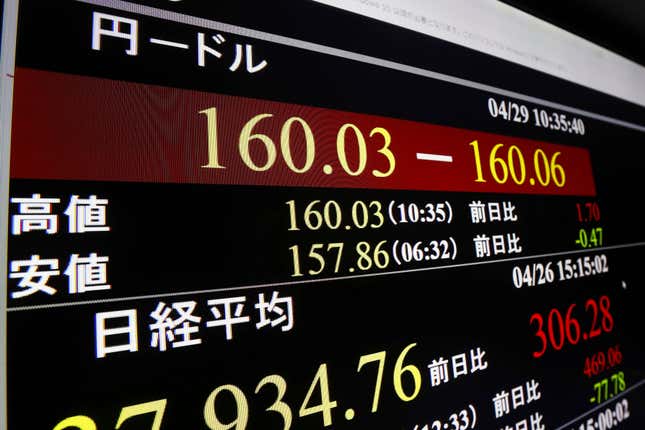
NEW YORK (AP) — Some of the world’s wildest action in financial markets is roiling around the Japanese yen.
The value of Japan’s currency has tumbled so much that for a moment on Monday it took 160 yen to equal $1. A few years ago, it took closer to 100 yen to make a U.S. dollar. The yen has been so weak that it’s back to where it was in 1990, shortly after Japan’s famous “bubble economy” burst.
After it briefly touched the 160 yen level in overnight hours for traders in New York, the value of a dollar quickly shifted back to 156 yen by midday Monday on the East Coast. Such sudden moves can happen in the foreign-exchange market, which can be notoriously volatile. Trading may also have been jumpy because of a holiday in Japan that kept its stock market closed. But the speed and degree of the yen’s swings raised speculation about whether Japanese officials were making moves to prop up the value of their currency.
The yen has long been under pressure as the Bank of Japan kept interest rates remarkably low to encourage more inflation in its economy. Only last month did it end its policy to keep its benchmark interest rate below zero.
The Bank of Japan’s latest decision on rates came on Friday, when it held interest rates steady. That helped spur this latest leg of weakness for the yen. The market may have been reacting to a lack of commitment by the Bank of Japan for more rate hikes in the near term, and the yen may remain under pressure into the third quarter of this year, strategists at Bank of America said in a BofA Global Research report.
That’s in part because of how solid the U.S. economy has remained. With inflation and the economy still higher than forecast, expectations are rising for the Federal Reserve to keep its main interest rate high for a while. That’s kept U.S. Treasury yields high and put upward pressure on the U.S. dollar’s value.
A weak yen is good for U.S. tourists heading to Japan, meaning each $1 of theirs buys more yen. It can also be a boon for Japan’s exporters because it boosts the value of their sales made in U.S. dollars when translated back into yen.
But keeping the yen weak carries risks. A central one is that it could cause inflation in Japan ultimately to overshoot targets and hurt the world’s third-largest economy. Japan imports almost all its energy, for example, and barrels of oil get traded in dollars, not yen.



